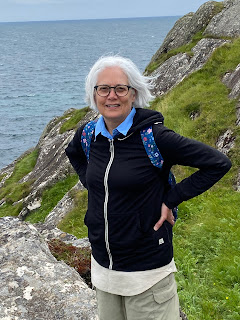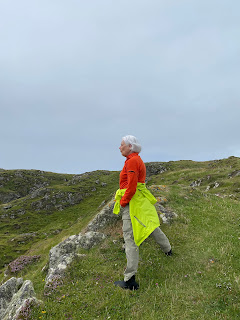Dr. Samuel Johnson, the 18th century writer, critic, lexicographer and more, was right, as he often was, with his aphorisms. In one, expressed before inclusive language, he wrote: “When a man is tired of London, he is tired of life.”I have never tired of life—or of London, a city I have loved since my first visit in 1986. I had just been graduated from General Seminary in New York City, and with earnings from freelance writing, my wife Penny and I flew to London. We spent a week in the city, seeing all the major sights there before traveling to Oxford, Canterbury, York and up to Scotland.
Since that first visit to London, I have returned often. The city reveals more of itself each time, including in July. I stayed in a small air b&b flat in Chelsea, with a great view of rooftops. (See photographs.) I enjoyed what was once a village in the southern part of the city. It still possesses a village feel, even amid the rumble of lorries and the honk of car horns and the walkways clotted with scurrying people.
My lodgings in a big hotel-style building, now converted into condominiums, were near London Underground Tube stops, but I spent my time on foot as far as possible. I love walking London streets, despite blistered feet, and discovering hidden, interesting places. One was the 18th century red brick Georgian townhouse off Piccadilly Circus where Ben Franklin lived a few years before the American Revolution, of course.
I toured museums, including the National Gallery and, for the first time ever, the Science Museum. It was fascinating. (I had decided that this visit I would do a few new things in the city, including make up for deficiencies in my formal education, science being one of them). For instance, I toured a floor devoted to engineering of all kinds: mechanical, electrical, computer, and medical. “Engineers solve problems,” the exhibit sign said. When I finished my visit, hours after I began, I thought—I hoped—that we humans might be able to engineer our way out of the ruin we have made of this planet. (At the time, Europe and the States were combusting in the heat and choking on the smoke from rampaging wild fires, the result of global warming. And still many people in elected office, who know better, deny this destructive reality and hope we will ignore it, too, and go on voting for them and keeping them in power.)
I visited London bookshops, including independent ones. There is an excellent one in Chelsea, one of the city’s oldest and best called John Sandhoe Books, an 18th century frame structure whose wood steps creak as you climb them.
I attended the principal Sunday Eucharist at Westminster Abbey, and as I left walked over the crypt of Sir Isaac Newton, one of the many worthies buried there, and a prayed and sang and tapped my foot during a jazz Evensong that day at St . Martin in the Fields, an old and progressive Church of England parish. Keeping company with the people buried in its crypt are patrons of the cafe in the undercroft, which serves tea and scones, sandwiches and whole meals. I enjoyed a slice of lemon cake and a cup of tea and rested my feet.
A lover of London theater, or theatre, if you will, I saw Martin McDonagh’s The Pillowman, a dark but at times humorous play. I enjoyed it as I did his other plays. I sat in the second row from the stage, so close I could see the pores in the actors’ faces or at least their wrinkles.
My time in the city over, I thought about visiting Oxford, a city for which I pine after my study there and after hours of watching PBS’s Morse and Endeavour; but instead, I took the train north to Manchester. I did some research in the library there on my Howerth ancestors, who lived in nearby Bolton before immigrating to the United States in the 19th century. One day, I hope to get to that now industrialized city and to the Church of England parish where my forebears were baptized, married, and some, buried. I also want to see Cheshire, and the Chomondeley castle, where my Chumbley forebears lived for centuries before immigrating to the Virginia Colony in the 17th century.
I found big, gray Manchester, the “London of the north,” interesting. It is blessed with an excellent tram system, which will move masses of people to wherever they want to go. I spent time in the Museum of Manufacturing and Science. I learned more about the Industrial Revolution, specifically weaving, my Howerth ancestors’ work. There is a great art museum there, too, where I enjoyed the paintings and ate breakfast most days and drank good strong coffee. I love to sit in the independent coffee shops of British cities and read the papers and write.
I took the train from Manchester up to Glasgow, delighting in the Scottish countryside of fir-clad mountains and shimmering lochs. I feel at home in Scotland, even more so than in England.
I met Penny in Oban, Scotland, and then we traveled together by ferry to idyllic Tiree, an island in the Hebrides, where we rented a thatched cottage that looked over the green pasture full of sheep and cows and out to sea, the north Atlantic. We spent our mornings in creative pursuits; she, painting and I, writing, including a short story, inspired by my time in Burry, outside of Manchester. We are now planning a trip next summer to the Hebridean island of Uist.
















